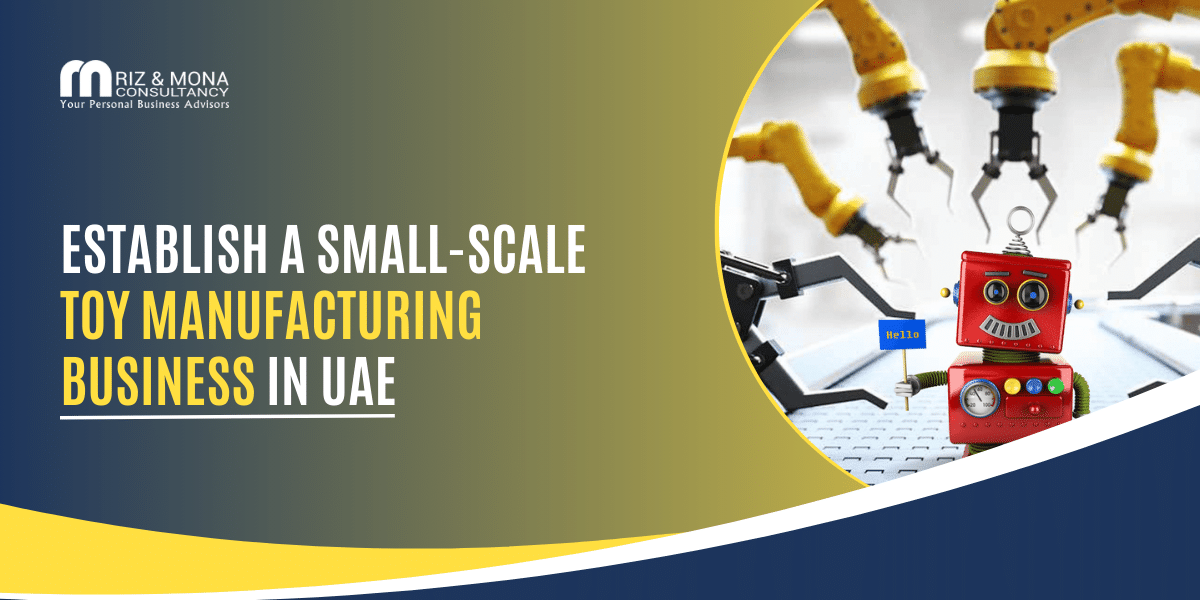Steps to Establish Toy Manufacturing Business in the UAE
Define Business Plan and Legal Structure
Determine the specific toy manufacturing activities your business will undertake.
Choose an appropriate legal structure for your toy company:
-
-
Mainland Company: Allows direct access to the UAE market.
-
Free Zone Entity: Offers benefits like 100% foreign ownership and tax exemptions.
-
Select a Suitable Location
Based on your chosen legal structure, select a location that aligns with your operational needs.
-
-
Mainland: Consider proximity to target markets and suppliers.
-
Free Zones: Evaluate zones like Jebel Ali Free Zone (JAFZA), Dubai Industrial City (DIC), or Ras Al Khaimah Economic Zone (RAKEZ) for their infrastructure and incentives.
-
Obtain Necessary Licenses and Approvals
Apply for an Industrial License from the relevant authority:
-
-
Mainland: Department of Economic Development (DED) of the respective emirate.
-
Free Zone: Respective Free Zone Authority.
-
Ensure compliance with safety standards set by the Emirates Authority for Standardization and Metrology (ESMA), including obtaining certifications like the Emirates Conformity Assessment Scheme (ECAS) and the Gulf Conformity Mark (G-Mark) for products intended for the GCC market.
Set Up Manufacturing Facility
-
Lease or purchase a facility suitable for toy production, considering factors like space requirements, utilities, and compliance with safety regulations.
-
Equip the facility with necessary machinery and tools tailored to your chosen toy categories.
Source Materials and Hire Staff
-
Establish relationships with reliable suppliers for raw materials, ensuring quality and compliance with safety standards.
-
Recruit skilled labor and administrative staff, adhering to UAE labor laws and visa requirements.
Implement Quality Control Measures
-
Develop and enforce quality assurance protocols to maintain product safety and consistency.
-
Regularly test products for durability, flammability, and toxicity, maintaining documentation for all processes.
Launch Marketing and Distribution
-
Develop a marketing strategy targeting your identified customer segments.
-
Establish distribution channels, including partnerships with retailers, online marketplaces, and direct sales to educational institutions and therapy centers.
Start Your Business Journey with Our Professional Support!
Types of Toys for Small-Scale Production
Selecting the right type of toy categories is essential for small-scale manufacturers aiming to establish a foothold in the UAE’s competitive toy industry.
Production Planning and Compliance
-
Facility Setup: Choose between mainland and free zone locations based on target markets and operational needs.
-
Material Sourcing: Prioritize local suppliers to reduce costs and support domestic production, ensuring all materials meet safety standards.
-
Quality Assurance: Implement regular testing for durability, flammability, and toxicity, maintaining documentation for all processes.
-
Certifications: Obtain necessary certifications like the Emirates Conformity Assessment Scheme (ECAS) and the Gulf Conformity Mark (G-Mark) for products intended for the GCC market.
Cost Management Strategies
-
Budget Allocation: Carefully plan expenditures for equipment, materials, labor, and compliance-related expenses.
-
Scaling Production: Start with a limited product range to test market response, scaling up based on demand and feedback.
-
Distribution Channels: Leverage e-commerce platforms like Noon or Mumzworld to reach consumers directly, minimizing reliance on traditional retail shelf space.
Business Setup Essentials for Toy Manufacturing Industry in the UAE
-
Mainland: Allows direct access to the UAE market. Businesses are licensed by the Department of Economic Development (DED) of the respective emirate. Recent regulations permit 100% foreign ownership, eliminating the need for a local sponsor.
-
Free Zones: Offer benefits like 100% foreign ownership, tax exemptions, and simplified import/export procedures. However, operations are generally limited to within the free zone or international markets unless additional permissions are obtained.
-
Industrial License: Mandatory for manufacturing activities, including toy production. Issued by the relevant authority based on business location (DED for mainland or the respective Free Zone Authority).
-
Product Certification: Compliance with safety standards set by the Emirates Authority for Standardization and Metrology (ESMA) is essential. This includes obtaining certifications like the Emirates Conformity Assessment Scheme (ECAS) and the Gulf Conformity Mark (G-Mark) for products intended for the GCC market.
- Facility Requirements: Depending on production scale, leasing industrial space may be necessary, with costs and availability varying between mainland and free zones.
- Labor and Visas: Both mainland and free zone setups allow hiring foreign labor. Free zones often provide streamlined visa services for employees.
- Customs and Logistics: Free zones offer customs advantages, especially for export-focused businesses, by providing efficient logistics and warehousing solutions.
Marketing and Distribution Strategies for Small-Scale Toy Manufacturers in the UAE
Navigating the competitive toy market in the UAE requires innovative marketing tactics and strategic distribution planning. Building upon our earlier discussions, let's delve deeper into advanced strategies that can provide small-scale manufacturers with a competitive edge.
| Category | Strategy | Description |
|---|---|---|
| Content Marketing and SEO Optimization | Educational Content Creation | Develop blog posts, videos, and tutorials to highlight the educational benefits of toys and position the brand as an authority in child development. |
| Search Engine Optimization (SEO) | Use relevant keywords to optimize your website and content, increasing visibility on search engines and attracting organic traffic. | |
| Community Engagement and Events | Workshops and Interactive Sessions | Host workshops in schools and community centers for hands-on demonstrations and direct customer engagement. |
| Participation in Local Festivals | Set up booths at local events to showcase products, allowing for hands-on experiences and real-time customer feedback. | |
| Strategic Partnerships | Collaborations with Educational Institutions | Partner with schools to integrate toys into teaching methods for real-world use and credibility. |
| Alliances with Child Development Experts | Work with child psychologists and educators to validate developmental benefits and enhance trust. | |
| Optimized Distribution Channels | Subscription-Based Models | Offer curated monthly toy boxes to maintain customer interest and build loyalty. |
| Direct-to-Consumer (DTC) Sales | Use your website and online marketplaces for direct sales, ensuring brand control and enhanced customer experience. | |
| Wholesale Distribution | Build partnerships with local retailers for bulk sales and wider reach. | |
| Export Opportunities | Expand to international markets interested in educational or eco-friendly toys, leveraging UAE’s trade advantages. | |
| Continuous Improvement and Feedback | Customer Feedback Loops | Collect and analyze feedback to improve products and marketing efforts. |
| Market Trend Analysis | Monitor global and regional toy industry trends to stay competitive and innovate accordingly. |
Domestic Sales Channels and B2B Opportunities
Collaborating with schools and nurseries can provide a steady demand for educational toys that align with curricular goals, particularly in areas emphasizing STEM education and language development. Additionally, supplying specialized toys to therapy centers can cater to children with specific developmental needs, supporting therapeutic activities and interventions.
Partnering with boutiques and gift shops that focus on unique, high-quality products can help showcase toys to discerning customers seeking distinctive items. Engaging with concept stores that curate themed collections offers an avenue to present toys that align with specific narratives or cultural themes, enhancing brand visibility and appeal.
Leveraging popular e-commerce platforms such as Noon, Mumzworld, and Amazon UAE can significantly broaden market reach. These platforms provide access to a growing base of online shoppers in the region, allowing manufacturers to present their products to a wider audience and adapt to the increasing trend of digital purchasing.
Strategic Free Zones for Toy Manufacturing
The UAE offers several free zones tailored to support small-scale toy manufacturers with infrastructure, cost-effective leasing, and export facilitation.
Marketing and Distribution Strategies for Small-Scale Toy Manufacturers in the UAE
1. Content Marketing and SEO Optimization
Educational Content Creation: Develop blog posts, videos, and tutorials that highlight the educational benefits of your toys. This positions your brand as an authority in child development and learning.
Search Engine Optimization (SEO): Optimize your website and content with relevant keywords to improve visibility on search engines, attracting organic traffic from parents and educators seeking quality toys.
2. Community Engagement and Events
Workshops and Interactive Sessions: Host workshops in schools and community centers to demonstrate the value and functionality of your toys, fostering direct engagement with potential customers.
Participation in Local Festivals: Set up booths at local events and festivals to showcase your products, allowing for hands-on experiences and immediate feedback.
3. Strategic Partnerships
Collaborations with Educational Institutions: Partner with schools and educational bodies to integrate your toys into their teaching methodologies, providing real-world applications and endorsements.
Alliances with Child Development Experts: Work with child psychologists and educators to validate the developmental benefits of your toys, enhancing credibility and appeal.
1. Subscription-Based Models
Toy Subscription Boxes: Offer monthly subscription boxes that deliver curated sets of toys, providing continuous engagement and fostering brand loyalty among customers.
2. Direct-to-Consumer (DTC) Sales
E-commerce Platforms: Leverage your website and online marketplaces to sell directly to consumers, allowing for better control over branding and customer experience.
3. Wholesale Distribution
Bulk Sales to Retailers: Establish relationships with local retailers and offer bulk purchasing options, ensuring wider reach and consistent sales channels.
4. Export Opportunities
International Market Expansion: Identify and target international markets with a demand for unique, educational, or eco-friendly toys, utilizing the UAE’s strategic location and trade agreements to facilitate exports.
Customer Feedback Loops: Implement systems to gather and analyze customer feedback, using insights to refine products and marketing strategies.
Market Trend Analysis: Stay abreast of global and regional toy industry trends to adapt offerings and remain competitive.
Financial Planning & Funding Options for UAE Toy Startups
Key Financial Considerations
Startup Costs: Initial expenses encompass equipment, raw materials, facility setup, and compliance certifications.
Operating Expenses: Ongoing costs include labor, utilities, maintenance, marketing, and distribution.
Cash Flow Management: Maintain healthy cash flow through timely invoicing, inventory management, and planning for seasonal demand fluctuations.
Funding Sources
Government Programs: Entities like the Emirates Development Bank (EDB) and the Mohammed Bin Rashid Innovation Fund offer financial support to startups.
Angel Investors & Venture Capital: Networks such as Dubai Angel Investors (DAI) and platforms like Eureeca provide investment opportunities.
Crowdfunding: Platforms like Beehive and Eureeca facilitate raising capital from a broad investor base.
Incubators & Accelerators: Programs like Hub71 offer mentorship, networking, and potential funding.
Traditional Bank Loans: Banks offer various loan products tailored to SMEs, though they may require collateral and thorough documentation.
Strategic Tips
Detailed Budgeting: Develop comprehensive budgets to monitor expenses and revenues effectively.
Regular Financial Reviews: Conduct periodic assessments to identify areas for cost reduction in toy manufacturing process.
Investment in Technology: Adopt technologies that enhance production efficiency and reduce operational costs.
Risk Management: Develop contingency plans to mitigate financial risks associated with market volatility or supply chain disruptions.
Regulatory Compliance & Quality Standards for UAE Toy Manufacturers
Startup Costs Overview
Launching a small-scale toy manufacturing business in the UAE typically requires an initial investment ranging from AED 50,000 to AED 150,000. This estimate encompasses essential expenditures, including:
-
Equipment: Purchasing or leasing machinery and tools necessary for toy production.
-
Materials: Procuring raw materials such as wood, fabrics, plastics, and non-toxic paints.
-
Workspace: Renting or leasing suitable production facilities, which may vary in cost depending on location and size.
-
Certification Fees: Covering the costs associated with obtaining mandatory certifications like the Emirates Conformity Assessment Scheme (ECAS) and the Gulf Conformity Mark (G-Mark) to ensure compliance with safety standards.
Funding Sources
To support these initial investments, several funding avenues are available:
-
Emirates Development Bank (EDB): As a government-owned financial institution, EDB offers financing solutions tailored to startups and SMEs operating within the manufacturing sector. The bank provides loans with competitive interest rates and flexible repayment terms, aiming to bolster the UAE’s industrial development.
-
SME Support Programs: Various programs at both federal and emirate levels offer financial assistance, grants, and incentives to small and medium-sized enterprises. These programs often focus on promoting innovation, sustainability, and local production.
FAQS (Frequently Asked Questions)
What licenses are required to start a toy manufacturing business in the UAE?
An Industrial License is mandatory for manufacturing activities. This license is issued by the Department of Economic Development (DED) for mainland companies or the respective Free Zone Authority for businesses operating within free zones.
Which free zones are most cost-effective for small-scale toy production?
Ras Al Khaimah Economic Zone (RAKEZ) and Umm Al Quwain Free Trade Zone (UAQ FTZ) are among the most cost-effective options, offering affordable leasing, streamlined setup processes, and SME-friendly policies.
How long does it take to set up a toy manufacturing company in the UAE?
The setup process typically takes 2 to 4 weeks, depending on the business structure, chosen location, and completeness of documentation.
Can toy manufacturers in the UAE export products to GCC countries without extra certification?
No. To export to GCC countries, products must comply with regional safety standards and obtain certifications like the Gulf Conformity Mark (G-Mark).
What safety standards must toys meet in the UAE?
Toys must adhere to standards set by the Emirates Authority for Standardization and Metrology (ESMA), including obtaining the Emirates Conformity Assessment Scheme (ECAS) certification.
What are the startup costs for a small toy factory in the UAE?
Startup costs range from AED 50,000 to AED 150,000, covering expenses such as equipment, materials, workspace, and certification fees.
Are there government-backed funding programs for toy manufacturers?
Yes. The Emirates Development Bank (EDB) offers financing solutions tailored to startups and SMEs in the manufacturing sector.
Can I start with home-based toy production before scaling up?
Yes, starting with home-based production is feasible. However, as the business grows, transitioning to a licensed facility is advisable to meet regulatory requirements.














